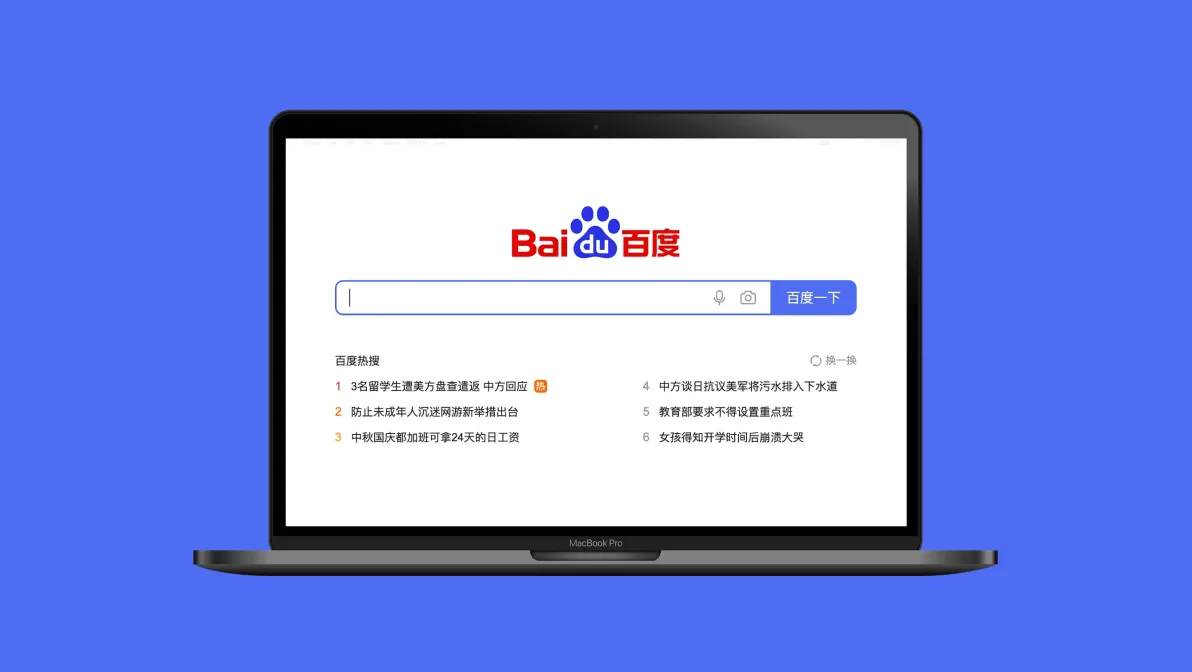Understanding China’s Search Engines
Written by

Alex Kelso
6 min read
6 min read


Explore the key search engines driving China’s digital marketing landscape and how brands can leverage them effectively.
Explore the key search engines driving China’s digital marketing landscape and how brands can leverage them effectively.
In this post:
In this post:
Section
Section
Originally posted on Medium, 31 August 2021.
Click here to browse the full article.
The Evolution of Search Engines in China
China's digital ecosystem has evolved almost independently of Western platforms, creating unique challenges for brands looking to establish a presence. Unlike in the West, where Google remains the primary search engine, China’s search environment is dominated by local platforms like Baidu, Sogou, and WeChat-integrated tools. In fact, up to 80% of product information searches in China begin directly on eCommerce platforms like Tmall, Taobao, or JD, where rich product listings offer far more detail than their Western counterparts. The focus is not on traditional SEO as we know it, but on eCommerce-driven, sales-centric ranking systems.
For brands navigating this space, understanding the limitations of SEO on eCommerce platforms like Tmall is crucial. The text on Tmall’s product pages is often embedded within images, making it difficult to optimise for traditional search engine indexing. The primary ranking factor on platforms like Tmall is sales performance rather than keyword-based organic searches. As a result, search engine optimisation in China requires an entirely different approach, one focused more on eCommerce performance and less on conventional content-driven SEO.
Strategies for Leveraging Search Engines in China
Despite the challenges, search engines still play an important role in the early stages of brand development. In particular, platforms like Baidu are useful for raising awareness in niche markets, such as for new products or categories like wine or craft beer. Creating wikis on Baidu Baike, the platform’s trusted online encyclopedia, can help establish credibility and build organic traffic. Once a brand is established, Search Engine Marketing (SEM) and the use of tools like Baidu Index provide insights into consumer interests and help optimise marketing strategies.
Using Baidu for SEM can be tricky; while it may drive traffic, that traffic is often still in the informational research phase rather than ready to buy. As such, the ROI from off-platform SEM is often less effective than advertising directly on eCommerce platforms where consumers are closer to the point of purchase. However, Baidu’s tools can still provide valuable market research and allow businesses to track trends and analyse competitors.
The Major Players: Baidu, Sogou, and Beyond
The primary search engine in China is Baidu, commanding over 70% of the market share. Its vast ecosystem includes tools like Baidu Baike, social media platforms like Baidu Space, and travel search with Qunar. For businesses, Baidu offers a comprehensive set of tools to increase visibility in both organic and paid search results. However, Sogou, with its 30% share, is a close competitor, particularly popular for its integration with WeChat articles, which makes it a vital resource for social listening and consumer insights. Meanwhile, Haosou (360 Search) offers affordable CPC rates, though its market share has been in decline. Finally, smaller platforms like Shenma provide mobile-focused search and shopping features, appealing to niche user groups.
Originally posted on Medium, 31 August 2021.
Click here to browse the full article.
The Evolution of Search Engines in China
China's digital ecosystem has evolved almost independently of Western platforms, creating unique challenges for brands looking to establish a presence. Unlike in the West, where Google remains the primary search engine, China’s search environment is dominated by local platforms like Baidu, Sogou, and WeChat-integrated tools. In fact, up to 80% of product information searches in China begin directly on eCommerce platforms like Tmall, Taobao, or JD, where rich product listings offer far more detail than their Western counterparts. The focus is not on traditional SEO as we know it, but on eCommerce-driven, sales-centric ranking systems.
For brands navigating this space, understanding the limitations of SEO on eCommerce platforms like Tmall is crucial. The text on Tmall’s product pages is often embedded within images, making it difficult to optimise for traditional search engine indexing. The primary ranking factor on platforms like Tmall is sales performance rather than keyword-based organic searches. As a result, search engine optimisation in China requires an entirely different approach, one focused more on eCommerce performance and less on conventional content-driven SEO.
Strategies for Leveraging Search Engines in China
Despite the challenges, search engines still play an important role in the early stages of brand development. In particular, platforms like Baidu are useful for raising awareness in niche markets, such as for new products or categories like wine or craft beer. Creating wikis on Baidu Baike, the platform’s trusted online encyclopedia, can help establish credibility and build organic traffic. Once a brand is established, Search Engine Marketing (SEM) and the use of tools like Baidu Index provide insights into consumer interests and help optimise marketing strategies.
Using Baidu for SEM can be tricky; while it may drive traffic, that traffic is often still in the informational research phase rather than ready to buy. As such, the ROI from off-platform SEM is often less effective than advertising directly on eCommerce platforms where consumers are closer to the point of purchase. However, Baidu’s tools can still provide valuable market research and allow businesses to track trends and analyse competitors.
The Major Players: Baidu, Sogou, and Beyond
The primary search engine in China is Baidu, commanding over 70% of the market share. Its vast ecosystem includes tools like Baidu Baike, social media platforms like Baidu Space, and travel search with Qunar. For businesses, Baidu offers a comprehensive set of tools to increase visibility in both organic and paid search results. However, Sogou, with its 30% share, is a close competitor, particularly popular for its integration with WeChat articles, which makes it a vital resource for social listening and consumer insights. Meanwhile, Haosou (360 Search) offers affordable CPC rates, though its market share has been in decline. Finally, smaller platforms like Shenma provide mobile-focused search and shopping features, appealing to niche user groups.
Ready to scale your brand to new heights?
If you want to build a high performing website that attracts more traffic and converts more leads, you've come to the right place.
Ready to level up your digital strategy?
Unlock growth with solutions designed for modern businesses - from Shopify eCommerce to performance-driven web design.
Ready to level up your digital strategy?
Unlock growth with solutions designed for modern businesses - from Shopify eCommerce to performance-driven web design.

Explore the key search engines driving China’s digital marketing landscape and how brands can leverage them effectively.
In this post:
Section
Originally posted on Medium, 31 August 2021.
Click here to browse the full article.
The Evolution of Search Engines in China
China's digital ecosystem has evolved almost independently of Western platforms, creating unique challenges for brands looking to establish a presence. Unlike in the West, where Google remains the primary search engine, China’s search environment is dominated by local platforms like Baidu, Sogou, and WeChat-integrated tools. In fact, up to 80% of product information searches in China begin directly on eCommerce platforms like Tmall, Taobao, or JD, where rich product listings offer far more detail than their Western counterparts. The focus is not on traditional SEO as we know it, but on eCommerce-driven, sales-centric ranking systems.
For brands navigating this space, understanding the limitations of SEO on eCommerce platforms like Tmall is crucial. The text on Tmall’s product pages is often embedded within images, making it difficult to optimise for traditional search engine indexing. The primary ranking factor on platforms like Tmall is sales performance rather than keyword-based organic searches. As a result, search engine optimisation in China requires an entirely different approach, one focused more on eCommerce performance and less on conventional content-driven SEO.
Strategies for Leveraging Search Engines in China
Despite the challenges, search engines still play an important role in the early stages of brand development. In particular, platforms like Baidu are useful for raising awareness in niche markets, such as for new products or categories like wine or craft beer. Creating wikis on Baidu Baike, the platform’s trusted online encyclopedia, can help establish credibility and build organic traffic. Once a brand is established, Search Engine Marketing (SEM) and the use of tools like Baidu Index provide insights into consumer interests and help optimise marketing strategies.
Using Baidu for SEM can be tricky; while it may drive traffic, that traffic is often still in the informational research phase rather than ready to buy. As such, the ROI from off-platform SEM is often less effective than advertising directly on eCommerce platforms where consumers are closer to the point of purchase. However, Baidu’s tools can still provide valuable market research and allow businesses to track trends and analyse competitors.
The Major Players: Baidu, Sogou, and Beyond
The primary search engine in China is Baidu, commanding over 70% of the market share. Its vast ecosystem includes tools like Baidu Baike, social media platforms like Baidu Space, and travel search with Qunar. For businesses, Baidu offers a comprehensive set of tools to increase visibility in both organic and paid search results. However, Sogou, with its 30% share, is a close competitor, particularly popular for its integration with WeChat articles, which makes it a vital resource for social listening and consumer insights. Meanwhile, Haosou (360 Search) offers affordable CPC rates, though its market share has been in decline. Finally, smaller platforms like Shenma provide mobile-focused search and shopping features, appealing to niche user groups.
Ready to scale your brand to new heights?
If you want to build a high performing website that attracts more traffic and converts more leads, you've come to the right place.
Ready to level up your digital strategy?
Unlock growth with solutions designed for modern businesses - from Shopify eCommerce to performance-driven web design.